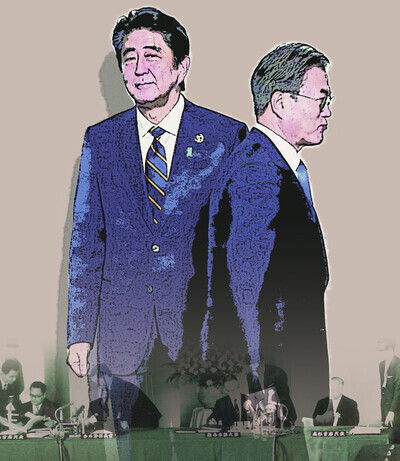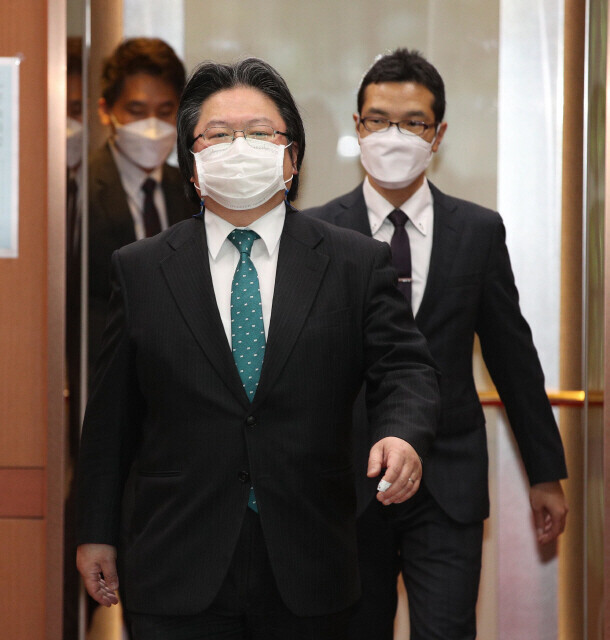hankyoreh
Links to other country sites 다른 나라 사이트 링크
Why did Japanese envoy make extremely inappropriate remarks about Moon?

Given confirmation that the number two official at Japan’s embassy to South Korea made an inappropriate remark about South Korean President Moon Jae-in on Thursday, the South Korean government’s efforts to use the Tokyo Olympics to improve relations with Japan, which are at their worst state in history, are at risk of coming to naught.
Gyeonggi Province Gov. Lee Jae-myung, who earlier said that South Korea should boycott the Olympics, vocally criticized the remark by Hirohisa Soma, deputy chief of mission at the Japanese Embassy. “It was so shocking and shameless that I can hardly believe my eyes and ears,” Lee said.
Even former Prime Minister Lee Nak-yon, regarded as the Korean politician with the best understanding of Japan, said that Japanese “politicians and officials are throwing cold water on bilateral relations with their offensive remarks.”
There were also calls for a tough response from Korea’s opposition party, which urged the government to “take appropriate measures.”
Soma’s remarks allow us to confirm once again that Japan’s diplomatic discourtesy toward South Korea has become more ingrained and even brazen since the two countries agreed to resolve the “comfort women” issue on Dec. 28, 2015.
The inappropriate remarks that Japanese politicians made about Korea in the past were typically aimed at denying the facts of history, such as through claiming that “the comfort women were professional prostitutes” or justifying Japan’s historical mistakes by claiming that its colonial rule of Korea ultimately had a positive impact on the country. One example of the latter tendency was the highly controversial remark by Japanese negotiator Kubota Kanichiro in the third round of Korea-Japan normalization talks in October 1953 that, if Japan hadn’t annexed Korea, it would have been occupied by Russia or China, which would have been even worse.
In short, the Japanese used to acknowledge that they’d been the aggressors while trying to make an excuse for their actions.
But Japanese society has lurched toward the right as the older generation with its memories of Japan’s responsibility for World War II passes on, and the comfort women agreement was signed in 2015, which has changed everything.

After South Korea hesitated to implement the comfort women agreement during the Park Geun-hye administration and then basically tried to nullify it during the Moon Jae-in administration, the Japanese have begun to adopt the attitude that they’re the victims of Koreans who “don’t keep their word.”
Japanese right-wing newspaper the Sankei Shimbun was the first to adopt that stance overtly.
Rui Abiru, an editorial writer for the newspaper, opined in July 2016 that Japan’s payment of 1 billion yen (US$9.9 million) to South Korea under the comfort women agreement made what had been a diplomatic issue between the two countries into a domestic issue for South Korea.
“Later on, we can exercise diplomacy from a position of moral superiority while attacking the Koreans for failing to implement their agreement,” Abiru said, referring specifically to Japan’s demand that South Korea relocate comfort women statues installed near Japanese diplomatic missions.
Japan’s attitude became more unmistakable after the South Korean Supreme Court ruled in October 2018 that Japanese companies must pay compensation to Koreans drafted for forced labor during World War II.
Taro Kono, Japan’s foreign minister at the time, released a statement in which he said that “South Korea needs to rectify the state of being in violation of international law.” According to Kono, the issue had to be resolved through unilateral measures by South Korea rather than a joint effort by both countries.
The Japanese had begun to perversely view themselves as victims who had moral superiority vis-à-vis South Korea, which wasn’t abiding by its promises to other countries — namely, the comfort women agreement — or even international law — the claims agreement South Korea and Japan concluded in 1965.
That was when Japan began to engage in the kind of rude behavior that would have been unimaginable in the past. Japanese Prime Minister Shinzo Abe completely omitted any mention of South Korea in his New Year’s policy address in January 2019, shortly after the South Korean Supreme Court’s ruling. With that omission, Abe made clear he didn’t intend to work with the Moon administration.
As if to remove any lingering doubts, Abe took nasty retaliatory measures against South Korea’s semiconductor industry, a key sector of its economy, that July.
When South Korea repeatedly asked for better relations after Yoshihide Suga was elected prime minister in September 2020, Suga retorted that South Korea needed to “create an opportunity for improving relations.” He also unilaterally disregarded Moon’s request for a brief meeting at the Group of Seven summit on June 12-13.
Soma’s remark on Thursday should be understood in the same context.
“Moon is masturbating,” Soma said during a luncheon with JTBC, a South Korean broadcaster, on Friday. “The Japanese government doesn’t have as much time to worry about bilateral relations as Korea assumes.”
But the point of Soma’s remarks on Friday was that South Korea needs to offer a solution for the issues of compensation for the comfort women and the victims of forced labor. Soma used this expression to criticize Moon’s efforts to persuade Japan to roll back regulations on export controls by paying a visit to Japan without proposing an acceptable solution to those pending issues.
This expression of Japan’s obstinacy creates yet another dilemma for the Blue House. Moon can’t make a diplomatic gamble to resolve politically sensitive disputes with Japan as his presidency nears an end. But neither can he disregard Korea’s relationship with its closest neighbor.
In a cautious statement on Sunday, the Blue House said it’s engaged in working-level talks with the view that Korea needs to hold a summit with Japan and that the summit needs to have meaningful results.
“The Ministry of Foreign Affairs has already taken measures in regard to Soma, and it wouldn’t be appropriate for the Blue House to comment on that. We’re urging the Japanese to change their attitude about getting results at the summit, but nothing has been finalized,” a Blue House official told the Hankyoreh.
By Gil Yun-hyung, staff reporter
Please direct comments or questions to [english@hani.co.kr]

Editorial・opinion
![[Editorial] Penalties for airing allegations against Korea’s first lady endanger free press [Editorial] Penalties for airing allegations against Korea’s first lady endanger free press](https://flexible.img.hani.co.kr/flexible/normal/500/300/imgdb/original/2024/0502/1817146398095106.jpg) [Editorial] Penalties for airing allegations against Korea’s first lady endanger free press
[Editorial] Penalties for airing allegations against Korea’s first lady endanger free press![[Editorial] Yoon must halt procurement of SM-3 interceptor missiles [Editorial] Yoon must halt procurement of SM-3 interceptor missiles](https://flexible.img.hani.co.kr/flexible/normal/500/300/imgdb/child/2024/0501/17145495551605_1717145495195344.jpg) [Editorial] Yoon must halt procurement of SM-3 interceptor missiles
[Editorial] Yoon must halt procurement of SM-3 interceptor missiles- [Guest essay] Maybe Korea’s rapid population decline is an opportunity, not a crisis
- [Column] Can Yoon steer diplomacy with Russia, China back on track?
- [Column] Season 2 of special prosecutor probe may be coming to Korea soon
- [Column] Park Geun-hye déjà vu in Yoon Suk-yeol
- [Editorial] New weight of N. Korea’s nuclear threats makes dialogue all the more urgent
- [Guest essay] The real reason Korea’s new right wants to dub Rhee a founding father
- [Column] ‘Choson’: Is it time we start referring to N. Korea in its own terms?
- [Editorial] Japan’s rewriting of history with Korea has gone too far
Most viewed articles
- 1Months and months of overdue wages are pushing migrant workers in Korea into debt
- 2Trump asks why US would defend Korea, hints at hiking Seoul’s defense cost burden
- 31 in 3 S. Korean security experts support nuclear armament, CSIS finds
- 4[Editorial] Penalties for airing allegations against Korea’s first lady endanger free press
- 5Bills for Itaewon crush inquiry, special counsel probe into Marine’s death pass National Assembly
- 6[Guest essay] Maybe Korea’s rapid population decline is an opportunity, not a crisis
- 760% of young Koreans see no need to have kids after marriage
- 8Korean firms cut costs, work overtime amid global economic uncertainties
- 9[Editorial] Yoon must halt procurement of SM-3 interceptor missiles
- 10Fruitless Yoon-Lee summit inflames partisan tensions in Korea